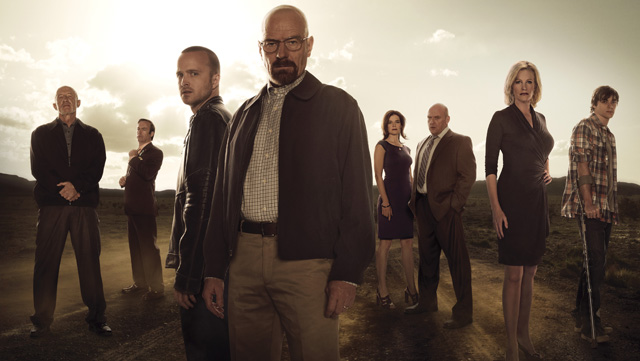All the hype about Breaking Bad is important because its greatness is almost completely dependent on its arc, yet it is now almost universally lauded as great despite not having an ending yet. Everyone I’ve spoken to about the show, every blog post or article I read, and everyone I follow on Twitter, have a certain collective understanding about how the show will end. It will be grim. There will be justice for protagonist-turned-antagonist Walter White, but it will come at the expense of innocents. We’re happy with that.
I think we’ve all come to this conclusion in part because we’re rooting for the show to be great—something else that’s unique about Breaking Bad. I loved the first season of Mad Men, thought it faltered a little in the second and third seasons, became amazing again, and by last season, I was happy to write about it for this site in a glibly ambivalent manner. I have no idea how Mad Men will end, just as I was in a great deal of suspense with how The Wire and The Sopranos would end, but I feel like I was more open to the idea of those shows failing me than I am about this one doing the same.
Maybe we root for the show so hard because, in a lot of ways, it’s not really as great as Mad Men or The Wire or The Sopranos. With the exception of the pilot episode—which, unlike those of many great shows, is perfect and gives an ideal preview of what’s to come—much of the first season of Breaking Bad, if I recall correctly, focuses on Walt lurching around suffering from cancer and berating his young partner Jesse Pinkman, having just enough close calls to keep the viewer going for another episode. The humor isn’t great early on, especially before the introduction of Bob Odenkirk’s flamboyantly smarmy lawyer character, Saul Goodman. Walter’s wife, Skyler, takes a long time to develop as a character. The first drug dealer Walter squares off with, Tuco, is ridículo. We tell people, “You have to watch Breaking Bad!” all the time, but to ask somebody to watch seven hours of something that isn’t great yet is pretty absurd, more absurd even than saying, “The first 70 pages of the novel are a little slow, but it really gets going later."
I’m not a big sports guy, and I’ve tried to be, but I understand the joy of rooting for a team in great moments. My parents met in Boston, and I was with them when the Red Sox won their first World Series in three millions years. My undergrad school’s basketball team gained “Cinderella” status and went to the Final Four just after I graduated. I was here for the sweep. Breaking Bad is kind of like Giants baseball: sometimes you’re excited or vindicated, but mostly you’re just tortured. Like sports fans, my fellow bloggers and I root for Breaking Bad to turn out to be as good as Hamlet and A Good Man Is Hard to Find and The Sopranos all rolled into one, as though our conscious extreme liking of it will actually make it better.
Watching last night’s episode, as is almost always the case, I felt a great deal of joy at watching the grim events unfold, despite that nothing truly unexpected happened. The episode begins with further hints of Walter’s inevitable dramatic fall—he tours his old house, now deserted, with his crime name, “HEISENBERG” spray-painted across a wall and kids shooting rad skateboarding videos in his pool. Hanging around an abandoned building with skateboarders, growing a beard, wearing big glasses—the true tragedy, apparently, is that Walt becomes a hipster.


